- Home
- Neil Gaiman
The Graveyard Book Page 15
The Graveyard Book Read online
Page 15
“You’re going to haunt me?” Her voice trembled.
Bod said nothing at all. He just stared at her. In the far corner of the room, something crashed: her bag had slipped off the chair onto the floor and when she looked back, she was alone in the room. Or, at least, there was nobody that she could see in there with her.
Her way home was going to be very long and very dark.
The boy and his guardian stood at the top of the hill, looking out at the lights of the town.
“Does it still hurt?” asked the boy.
“A little,” said his guardian. “But I heal fast. I’ll soon be as good as ever.”
“Could it have killed you? Stepping out in front of that car?”
His guardian shook his head. “There are ways to kill people like me,” he said. “But they don’t involve cars. I am very old and very tough.”
Bod said, “I was wrong, wasn’t I? The whole idea was to do it without anybody noticing. And then I had to get involved with the kids in the school, and the next thing you know, there’s police and all sorts of stuff. Because I was selfish.”
Silas raised an eyebrow. “You weren’t selfish. You need to be among your own kind. Quite understandable. It’s just harder out there in the world of the living, and we cannot protect you out there as easily. I wanted to keep you perfectly safe,” said Silas. “But there is only one perfectly safe place for your kind and you will not reach it until all your adventures are over and none of them matter any longer.”
Bod rubbed his hand over the stone of Thomas R. Stout (1817–1851. Deeply regretted by all who knew him), feeling the moss crumble beneath his fingers.
“He’s still out there,” said Bod. “The man who killed my first family. I still need to learn about people. Are you going to stop me leaving the graveyard?”
“No. That was a mistake and one that we have both learned from.”
“Then what?”
“We should do our best to satisfy your interest in stories and books and the world. There are libraries. There are other ways. And there are many situations in which there might be other, living people around you, like the theater or the cinema.”
“What’s that? Is it like football? I enjoyed watching them play football at school.”
“Football. Hmm. That’s usually a little early in the day for me,” said Silas. “But Miss Lupescu could take you to see a football match the next time she’s here.”
“I’d like that,” said Bod.
They began to walk down the hill. Silas said, “We have both left too many tracks and traces in the last few weeks. They are still looking for you, you know.”
“You said that before,” said Bod. “How do you know? And who are they? And what do they want?”
But Silas only shook his head, and would be drawn no further, and with that, for the time being, Bod had to be satisfied.
CHAPTER SEVEN
Every Man Jack
SILAS HAD BEEN PREOCCUPIED for the previous several months. He had begun to leave the graveyard for days, sometimes weeks, at a time. Over Christmas, Miss Lupescu had come out for three weeks in his place, and Bod had shared her meals in her little flat in the Old Town. She had even taken him to a football match, as Silas had promised that she would, but she had gone back to the place she called “The Old Country” after squeezing Bod’s cheeks and calling him Nimini, which had become her pet name for him.
Now Silas was gone, and Miss Lupescu also. Mr. and Mrs. Owens were sitting in Josiah Worthington’s tomb talking to Josiah Worthington. None of them was happy.
Josiah Worthington said, “You mean to say that he did not tell either of you where he was going or how the child was to be cared for?”
When the Owenses shook their heads, Josiah Worthington said, “Well, where is he?”
Neither Owens was able to answer. Master Owens said, “He’s never been gone for so long before. And he promised, when the child came to us, promised he would be here, or someone else would be here to help us care for him. He promised.”
Mrs. Owens said, “I worry that something must have happened to him.” She seemed close to tears, and then her tears turned to anger, and she said, “This is too bad of him! Is there no way to find him, to call him back?”
“None that I know,” said Josiah Worthington. “But I believe that he’s left money in the crypt, for food for the boy.”
“Money!” said Mrs. Owens. “What use is money?”
“Bod will be needing money if he’s to go out there to buy food,” began Mr. Owens, but Mrs. Owens turned on him.
“You’re all as bad as each other!” she said.
She left the Worthington tomb, then, and she went looking for her son, whom she found, as she expected to, at the top of the hill, staring out over the town.
“Penny for your thoughts,” said Mrs. Owens.
“You don’t have a penny,” said Bod. He was fourteen, now, and taller than his mother.
“I’ve got two in the coffin,” said Mrs. Owens. “Probably a bit green by now, but I’ve still got them right enough.”
“I was thinking about the world,” said Bod. “How do we even know that the person who killed my family is still alive? That he’s out there?”
“Silas says he is,” said Mrs. Owens.
“But Silas doesn’t tell us anything else.”
Mrs. Owens said, “He means only the best for you. You know that.”
“Thanks,” said Bod, unimpressed. “So where is he?”
Mrs. Owens made no reply.
Bod said, “You saw the man who killed my family, didn’t you? On the day you adopted me.”
Mrs. Owens nodded.
“What was he like?”
“Mostly, I had eyes for you. Let me see…he had dark hair, very dark. And I was frightened of him. He had a sharp face. Hungry and angry all at once, he was. Silas saw him off.”
“Why didn’t Silas just kill him?” said Bod, fiercely. “He should have just killed him then.”
Mrs. Owens touched the back of Bod’s hand with her cold fingers. She said, “He’s not a monster, Bod.”
“If Silas had killed him back then, I would be safe now. I could go anywhere.”
“Silas knows more than you do about all this, more than any of us do. And Silas knows about life and death,” said Mrs. Owens. “It’s not that easy.”
Bod said, “What was his name? The man who killed them.”
“He didn’t say it. Not then.”
Bod put his head on one side, and stared at her with eyes as grey as thunderclouds. “But you know it, don’t you?”
Mrs. Owens said, “There’s nothing you can do, Bod.”
“There is. I can learn. I can learn everything I need to know, all I can. I learned about ghoul-gates. I learned to Dreamwalk. Miss Lupescu taught me how to watch the stars. Silas taught me silence. I can Haunt. I can Fade. I know every inch of this graveyard.”
Mrs. Owens reached out a hand, touched her son’s shoulder. “One day,” she said…and then she hesitated. One day, she would not be able to touch him. One day, he would leave them. One day. And then she said, “Silas told me the man who killed your family was called Jack.”
Bod said nothing. Then he nodded. “Mother?”
“What is it, son?”
“When will Silas come back?”
The midnight wind was cold and it came from the north.
Mrs. Owens was no longer angry. She feared for her son. She said only, “I wish I knew, my darling boy, I wish I knew.”
Scarlett Amber Perkins was fifteen, and, at that moment, sitting on the upper deck of the elderly bus, she was a mass of angry hate. She hated her parents for splitting up. She hated her mother for moving away from Scotland, hated her father because he didn’t seem to care that she had gone. She hated this town for being so different—nothing like Glasgow, where she had grown up—and she hated it because every now and again she would turn a corner and see something and the world would all become achingly, horrib
ly familiar.
She had lost it with her mother that morning. “At least in Glasgow I had friends!” Scarlett had said, and she wasn’t quite shouting and she wasn’t quite sobbing. “I’ll never see them again!” All her mother had said in reply was, “At least you’re somewhere you’ve been before. I mean, we lived here when you were little.”
“I don’t remember,” said Scarlett. “And it’s not like I still know anyone. Do you want me to find my old friends from when I was five? Is that what you want?”
And her mother said, “Well, I’m not stopping you.”
Scarlett had gone through the whole of the school day angry, and she was angry now. She hated her school and she hated the world, and right now she particularly hated the town bus service.
Every day, when school was over, the 97 bus to the City Center would take her from her school gates all the way to the end of the street where her mother had rented a small flat. She had waited at the bus-stop on that gusty April day for almost half an hour and no 97 buses had appeared, so when she saw a 121 bus with City Center as its destination she had climbed aboard. But where her bus always turned right, this one turned left, into the Old Town, past the municipal gardens in the Old Town square, past the statue of Josiah Worthington, Bart., and then crept up a winding hill lined with high houses, as Scarlett’s heart sank and her anger was replaced with misery.
She walked downstairs, edged forward, eyed the sign telling her not to speak to the driver when the vehicle was in motion, and said, “Excuse me. I wanted to go to Acacia Avenue.”
The driver, a large woman, her skin even darker than Scarlett’s said, “You should have got the 97, then.”
“But this goes to the City Center.”
“Eventually. But even when you get there, you’ll still need to get back.” The woman sighed. “Best thing you can do, get off here, walk back down the hill, there’s a bus-stop in front of the town hall. From there, you can catch the number 4 or the 58, both of them will take you most of the way to Acacia Avenue. You could get off by the sports center and walk up from there. You got all that?”
“The 4 or the 58.”
“I’ll let you off here.” It was a request stop on the side of the hill, just past a large pair of open iron gates, and it looked uninviting and dismal. Scarlett stood in the open doorway of the bus until the bus driver said, “Go on. Hop it.” She stepped down onto the pavement and the bus belched black smoke and roared away.
The wind rattled the trees on the other side of the wall.
Scarlett began to walk back down the hill—this was why she needed a mobile phone, she thought. If she was so much as five minutes late, her mother would freak, but she still wouldn’t buy Scarlett a phone of her own. Oh well. She would have to endure another shouting match. It wouldn’t be the first and it wouldn’t be the last.
By now she was level with the open gates. She glanced inside and…
“That’s odd,” she said, aloud.
There’s an expression, déja vu, that means that you feel like you’ve been somewhere before, that you’ve somehow already dreamed it or experienced it in your mind. Scarlett had experienced it—the knowledge that a teacher was just about to tell them that she’d been to Inverness on holiday, or that someone had dropped a spoon in just that way before. This was different. This wasn’t a feeling that she had been here before. This was the real thing.
Scarlett walked through the open gates into the graveyard.
A magpie flew up as she walked in, a flash of black and white and iridescent green, and settled in the branches of a yew tree, watching her. Around that corner, she thought, is a church, with a bench in front of it, and she turned a corner to see a church—much smaller than the one in her head, a sinister blocky little Gothic building of grey stone, with a jutting spire. In front of it was a weathered wooden bench. She walked over, sat down on the bench, and swung her legs as if she was still a little girl.
“Hullo. Um, hullo?” said a voice from behind her. “Awful cheek of me, I know, but would you help me hold down this, er, just really need another pair of hands, if it’s not too much trouble.”
Scarlett looked around, and saw a man in a fawn-colored raincoat squatting in front of a gravestone. He was holding a large sheet of paper which was blowing about in the wind. She hurried over to him.
“You hold on to it here,” said the man. “One hand here, one hand there, that’s it. Frightful imposition, I know. Ridiculously grateful.”
He had a biscuit tin next to him, and from the tin he pulled what looked like a crayon the size of a small candle. He began rubbing it back and forth across the stone with easy, practiced movements.
“There we go,” he said, cheerfully. “And here she comes…oops. A wiggly bit, down at the bottom here, I think it’s meant to be ivy—the Victorians loved putting ivy on things, deeply symbolic you know…and there we are. You can let go now.”
He stood up, ran one hand through his grey hair. “Ow. Needed to stand. Legs got a bit pins-and-needlesy,” he said. “So. What do you reckon to that?”
The actual headstone was covered in green and yellow lichen, and so worn and faded as to almost be undecipherable, but the rubbing was clear. “Majella Godspeed, Spinster of this Parish, 1791–1870, Lost to All But Memory,” Scarlett read aloud.
“And probably now lost even to that,” said the man. His hair was thinning, and he smiled hesitantly and blinked at her through small, round glasses which made him look a little like a friendly owl.
A large raindrop splashed down on the paper, and the man hurriedly rolled it up and grabbed his tin box of crayons. Another handful of raindrops, and Scarlett picked up the portfolio the man pointed to, propped up beside a nearby gravestone, and followed him into the tiny porch of the church, where the rain could not touch them.
“Thank you so much,” said the man. “I don’t think it’s really going to rain much. Weather forecast for this afternoon said mostly sunny.”
As if in reply, the wind gusted coldly and the rain began to beat down in earnest.
“I know what you’re thinking,” the gravestone-rubbing man said to Scarlett.
“You do?” she said. She had been thinking, My mum will kill me.
“You’re thinking, is this a church or a funeral chapel? And the answer is, as far as I can ascertain, that on this site there was indeed a small church, and the original graveyard would have been its churchyard. That’s as long ago as eight, perhaps nine hundred A. D. Rebuilt and extended several times in there. But there was a fire here in the 1820s and by that time it was already much too small for the area. People around here were using St. Dunstan’s in the village square as their parish church, so when they came to rebuild here, they made it a funeral chapel, keeping many of the original features—the stained glass windows in the far wall are said to be original…”
“Actually,” said Scarlett, “I was thinking that my mum is going to kill me. I got the wrong bus and I am already so late home…”
“Good Lord, you poor thing,” said the man. “Look, I only live just down the road. You wait here—” And with that he thrust his portfolio, his tin of crayons, and his rolled-up sheet of paper into her hands and he set off at a trot down to the gates, his shoulders hunched against the driving rain. A couple of minutes later, Scarlett saw the lights of a car and heard the sound of a car horn.
Scarlett ran down to the gates, where she could see the car, an elderly green Mini. The man she had been talking to was sitting in the driver’s seat. He wound down his window.
“Come on,” he said. “Where exactly am I taking you?”
Scarlett stood there, the rain running down her neck. “I don’t take rides from strangers,” she said.
“Quite right too,” said the man. “But one good turn deserves, and, um, all that. Here, put the stuff in the back before it gets soaked.” He pulled open the passenger door, and Scarlett leaned inside and put his graverubbing equipment down on the backseat as best she could. “Tell you what
,” he said. “Why don’t you phone your mother—you can use my phone—and tell her my car’s number plate? You can do it from inside the car. You’re getting soaked out there.”
Scarlett hesitated. Rain was beginning to plaster her hair down. It was cold.
The man reached over and handed her his mobile phone. Scarlett looked at it. She realized she was more afraid of calling her mother than she was of getting into the car. Then she said, “I could call the police too, couldn’t I?”
“You certainly can, yes. Or you can walk home. Or you can just call your mother and ask her to come and pick you up.”
Scarlett got into the passenger seat and closed the door. She kept hold of the man’s phone.
“Where do you live?” the man asked.
“You really don’t have to. I mean, you could just take me to the bus stop…”
“I’ll take you home. Address?”
“102a Acacia Avenue. It’s off the main road, a wee bit past the big sports center…”
“You are out of your way, aren’t you? Right. Let’s get you home.” He took off the handbrake, swung the car around, and drove down the hill.
“Been living here long?” he said.
“Not really. We moved here just after Christmas. We lived here when I was five, though.”
“Is that a brogue I detect in your accent?”
“We’ve been living in Scotland for ten years. There, I sounded like everyone else, and then I came down here, and now I stick out like a sore thumb.” She had wanted it to sound like a joke, but it was true, and she could hear it as she said it. Not funny, just bitter.
The man drove to Acacia Avenue, parked in front of the house, then insisted on coming up to the front door with her. When the door was opened he said, “Frightfully sorry. I took the liberty of bringing your daughter back to you. Obviously, you taught her well, shouldn’t accept rides from strangers. But, well, it was raining, she took the wrong bus, wound up on the other side of town. Bit of a mess all around really. Say you can find it in your heart to forgive. Forgive her. And, um, me.”

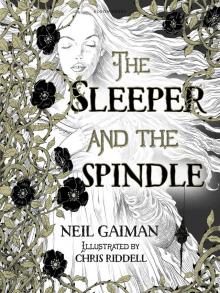 The Sleeper and the Spindle
The Sleeper and the Spindle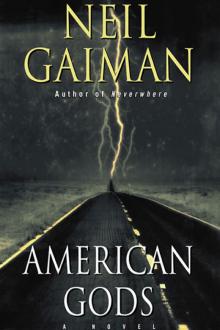 American Gods
American Gods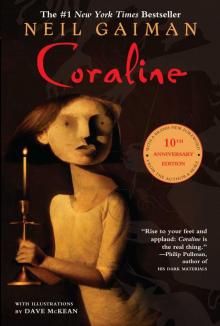 Coraline
Coraline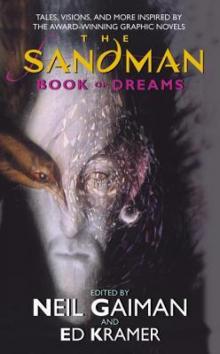 The Sandman: Book of Dreams
The Sandman: Book of Dreams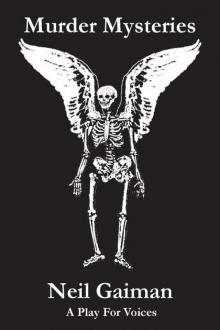 Murder Mysteries
Murder Mysteries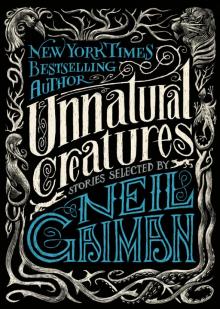 Unnatural Creatures
Unnatural Creatures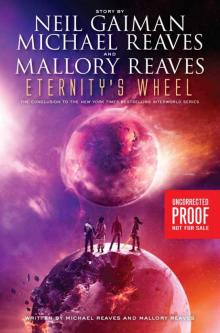 Eternity's Wheel
Eternity's Wheel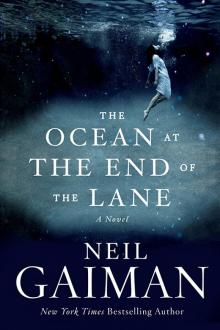 The Ocean at the End of the Lane
The Ocean at the End of the Lane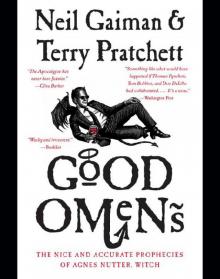 Good Omens
Good Omens Stardust
Stardust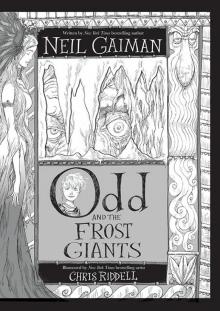 Odd and the Frost Giants
Odd and the Frost Giants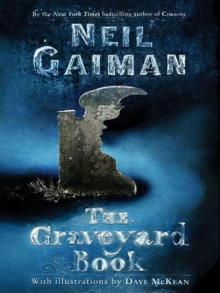 The Graveyard Book
The Graveyard Book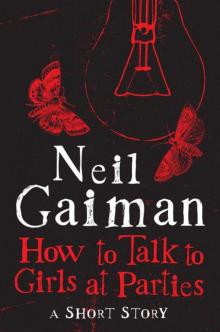 How to Talk to Girls at Parties
How to Talk to Girls at Parties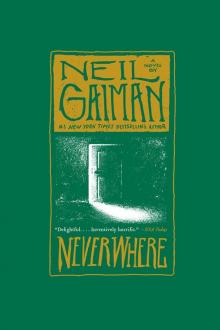 Neverwhere
Neverwhere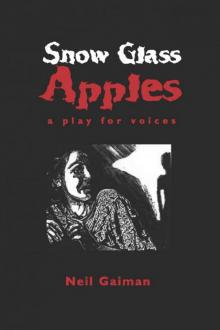 Snow, Glass, Apples
Snow, Glass, Apples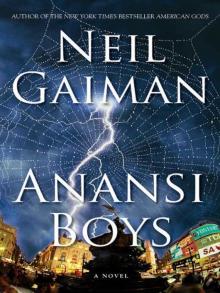 Anansi Boys
Anansi Boys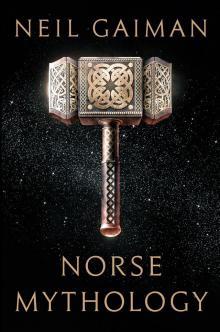 Norse Mythology
Norse Mythology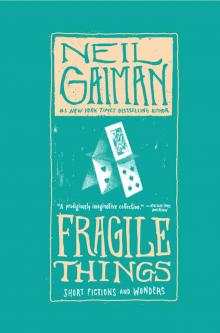 Fragile Things: Short Fictions and Wonders
Fragile Things: Short Fictions and Wonders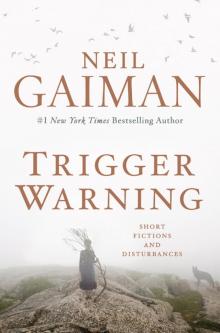 Trigger Warning: Short Fictions and Disturbances
Trigger Warning: Short Fictions and Disturbances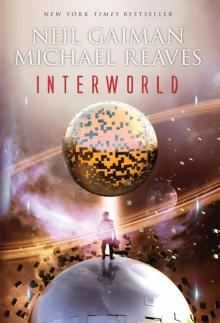 InterWorld
InterWorld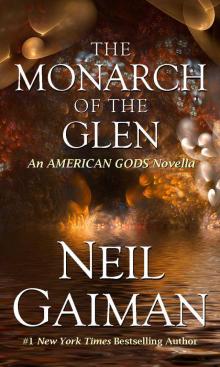 The Monarch of the Glen
The Monarch of the Glen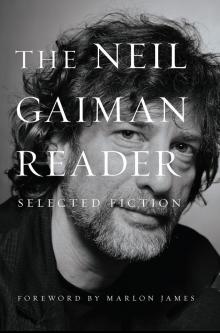 The Neil Gaiman Reader
The Neil Gaiman Reader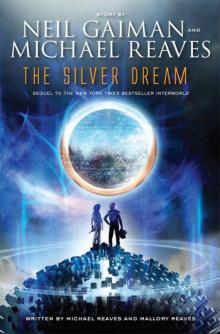 The Silver Dream
The Silver Dream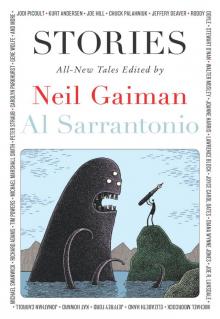 Stories
Stories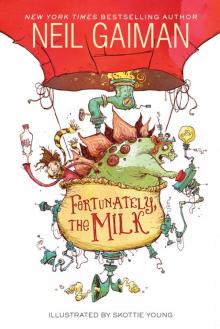 Fortunately, the Milk
Fortunately, the Milk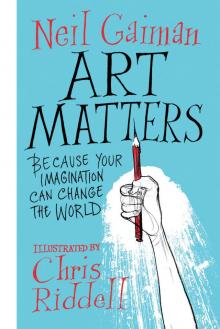 Art Matters
Art Matters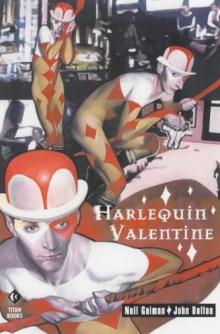 Harlequin Valentine
Harlequin Valentine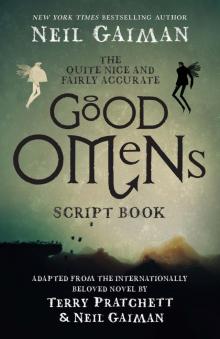 The Quite Nice and Fairly Accurate Good Omens Script Book
The Quite Nice and Fairly Accurate Good Omens Script Book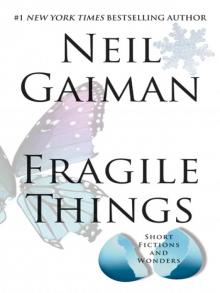 Fragile Things
Fragile Things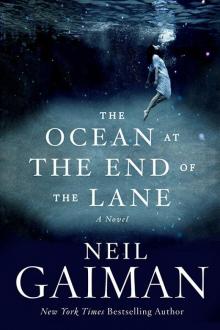 The Ocean at the End of the Lane: A Novel
The Ocean at the End of the Lane: A Novel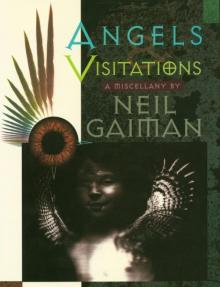 Angels and Visitations
Angels and Visitations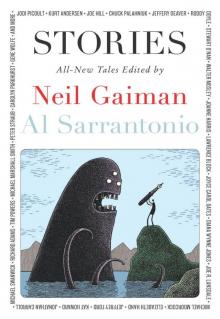 Stories: All-New Tales ngss-1
Stories: All-New Tales ngss-1 Don't Panic
Don't Panic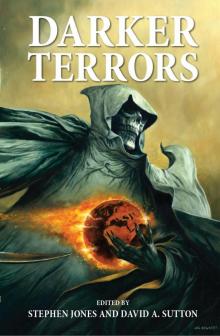 Darker Terrors
Darker Terrors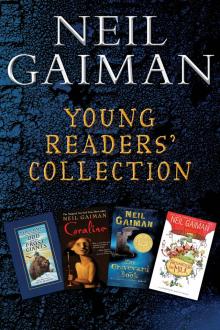 Neil Gaiman Young Readers' Collection
Neil Gaiman Young Readers' Collection A Study In Emerald
A Study In Emerald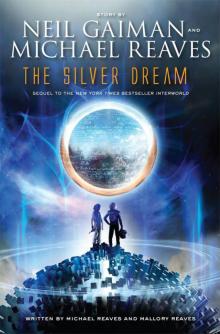 The Silver Dream: An InterWorld Novel
The Silver Dream: An InterWorld Novel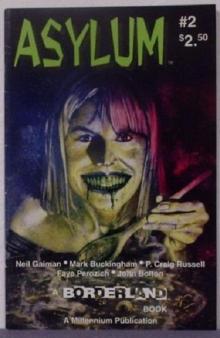 Feeders and Eaters
Feeders and Eaters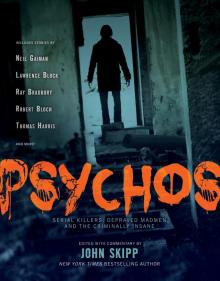 Psychos
Psychos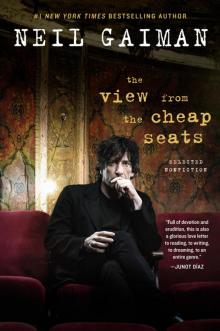 The View from the Cheap Seats
The View from the Cheap Seats Trigger Warning
Trigger Warning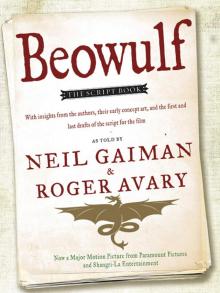 Beowulf
Beowulf Nessun Dove
Nessun Dove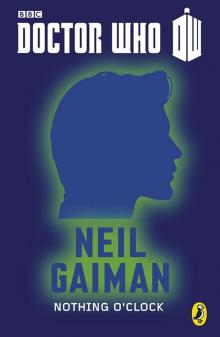 Doctor Who: Nothing O'Clock: Eleventh Doctor: 50th Anniversary
Doctor Who: Nothing O'Clock: Eleventh Doctor: 50th Anniversary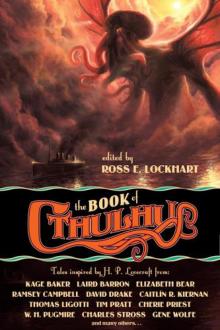 The Book of Cthulhu
The Book of Cthulhu